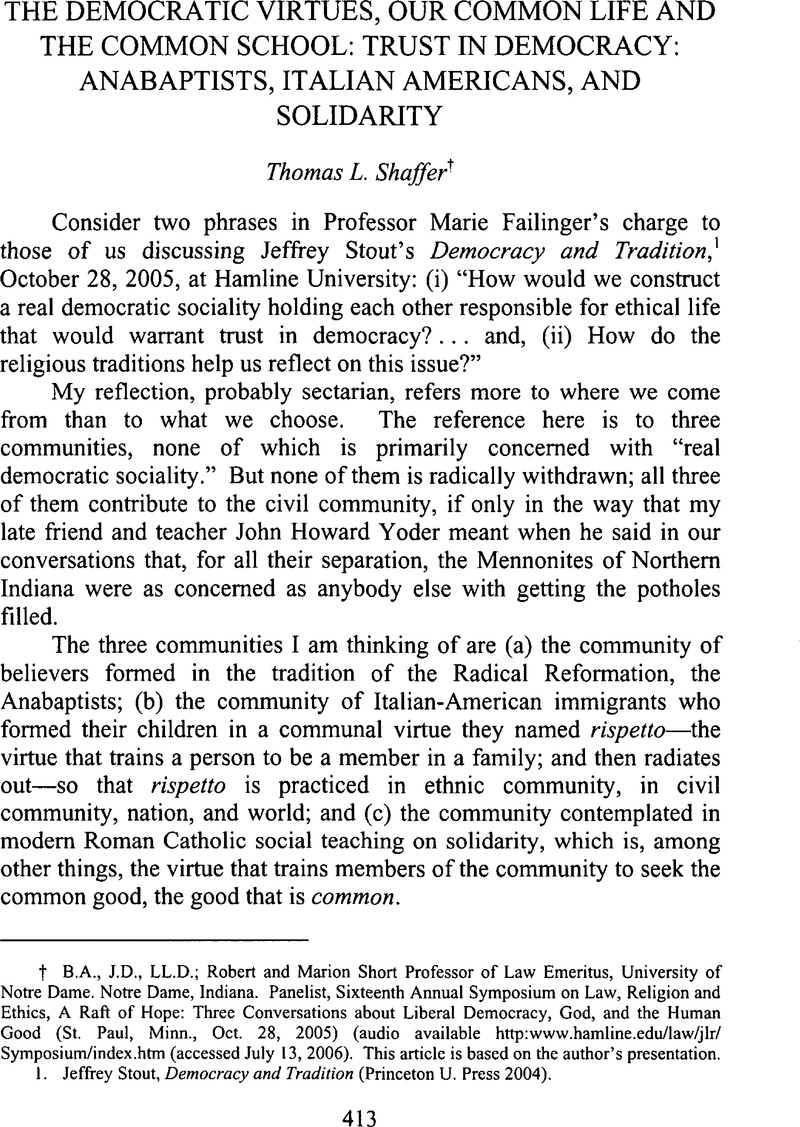No CrossRef data available.
Published online by Cambridge University Press: 24 April 2015

1. Stout, Jeffrey, Democracy and Tradition (Princeton U. Press 2004)Google Scholar.
2. Yoder, John Howard, For the Nations (Eerdmans 1997)Google Scholar.
3. Jer 29:4-8 (All Biblical citations are taken from the New English Bible.).
4. Pratt, Dorothy O., Shipshewana (Quarry Books 2004)Google Scholar.
5. This section is drawn from the article by my daughter Mary and me, Shaffer, Thomas L. & Shaffer, Mary M., Character and Community: Rispetto as a Virtue in the Tradition of Italian-American Lawyers, 64 Notre Dame L. Rev. 838 (1989)Google Scholar, adapted as part of our book Shaffer, Thomas L. & Shaffer, Mary M., American Lawyers and Their Communities (U. Notre Dame Press 1991)Google Scholar. First-person contributions, not attributed for the most part, were from students, lawyers, and colleagues we shared our teaching lives with. I am aware that a similar moral focus could be attempted for other immigrant groups; one reason we chose Italians is that Mary speaks and writes and teaches Italian and is richly acquainted with many Italians, some in the United States, some in Italy, some in France. What has been important, I think, is that we did our work with a late-immigrant group. Older immigrant groups—the Irish, the Germans, the English and Welsh and Scots from whom our family comes—have, much more than the Italians, lost their immigrant edge, and in our case have seen it replaced with the residues of the western frontier in North America. I can do much more toward explaining myself as I think about being the only male in three generations of my family who is not a cowboy than I can with the fact that four of my great-grandparents came from Ireland and Wales.
6. The Pentateuch and Haftorahs 523, n. 27 (Hertz, J.H. ed., 2d ed., Soncino 1987)Google Scholar. See also Prayers of Repentance on the Day of Atonement, in Praying with the Jewish Tradition 87–98 (Kopciowski, Elias ed., Clifford, Paula trans., Eerdmans 1997)Google Scholar.
7. Yoder, John Howard, To Hear the Word (Wipf & Stock Publishers 2001)Google Scholar.
8. Yoder, John Howard, The Hermeneutics of Peoplehood: A Protestant Perspective on Practical Moral Reasoning, 10 J. Relig. Ethics 40 (1982)Google Scholar.
9. Heyer, Kristin E., Bridging the Divide in Contemporary U.S. Catholic Social Ethics, 66 Theological Stud. 401 (2005)CrossRefGoogle Scholar.